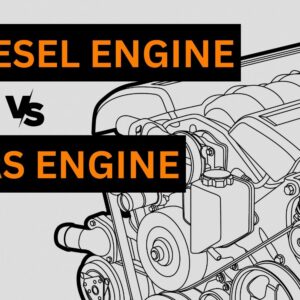Large vehicles like semi trucks use diesel instead of gasoline. Diesel and gasoline might just sound like two different types of fuel that you might find at the pump, but they have unique properties that give them distinct advantages in specific use cases.
For example, gasoline engines are known to be quieter and better suited for sporty vehicles. However, there are also many advantages of using diesel engines. For one, they’re known to be better when it comes to hauling heavy vehicles and loads over long distances. Additionally, on the average, diesel engines have a lot longer life than gasoline engines before needing major repairs. A diesel engine will also get much better fuel economy than the same size gasoline engine.
In this article, we’ll discuss why trucks use diesel and diesel’s distinct advantages over gasoline.
Greater Energy Density
One reason why diesel is preferred when it comes to vehicles that haul heavy loads is because it contains more energy per unit of volume compared to gasoline. This means that a liter of diesel will be able to create more energy than a liter of gasoline. How much more energy? Diesel has around 10% to 15% more energy than gasoline. Because of this and various other reasons that we’ll discuss later, diesel engines tend to be around 33% more fuel-efficient than their gasoline counterparts.
Diesel Engines Can Produce More Torque
The other reason why diesel engines are better for hauling heavy loads is because they’re able to produce more torque at lower engine revolutions per minute (RPMs). Semi trucks need torque to move heavy loads. While torque is related to horsepower, they’re not the same thing. To understand torque, you can try to imagine trying to turn a stubborn bolt with a wrench. The force that you apply to the wrench is essentially torque. You need a lot of it to move the stubborn bolt. In a truck, the engine generates this turning force. When you’re carrying heavy loads, having a diesel engine with high torque is like having extra leverage that helps the truck overcome its static inertia.
This high torque output allows diesel vehicles to accelerate with heavy loads even at low RPMs. The driver of a diesel vehicle can simply mash the throttle even at low RPM and the vehicle will go. In comparison, the driver of a gasoline vehicle will need to rev the engine more for the vehicle to create enough torque to overcome inertia.
Diesel engines differ from gasoline engines in how they ignite the air-fuel mixture in their cylinders. Gas engines need a spark plug to achieve ignition. Diesel engines use compression to raise the temperature of the air to the point that diesel combusts as soon as it’s injected ínto the cylinder. The high compression ratio of diesel engines leads to more energy released per stroke, and therefore more torque.
Diesel engines also have a longer stroke length, which means pistons travel further down before reaching the bottom of the stroke. As a result, the piston has more time to push down against the crankshaft and produce more torque. This results in high torque output even when the engine is only running at low engine RPM.
Diesel Engines Are More Efficient
Since diesel engines can create more torque at low RPM, it means diesel engines don’t need to rev their engines high when they need to climb hills or accelerate. More importantly, vehicles with diesel engines can maintain a lower RPM when cruising on the interstate. Running at a lower engine RPM results in less fuel consumption because the engine doesn’t need to undergo more cycles.
Another reason why diesel engines are more efficient is that diesel self-ignites inside the engine. As mentioned earlier, diesel doesn’t rely on a spark to combust. Instead, diesel automatically ignites when it’s compressed. The pistons compress the air into the cylinder and only then is diesel injected, which results in the diesel automatically igniting. Auto-igniting diesel fuel is much more thermally efficient than the spark ignition found in gasoline engines. This means diesel can create more work out of the heat generated during combustion.
Given the many advantages of diesel fuel, you might be wondering why not all vehicles use diesel instead. Well, diesel also has a lot of drawbacks. For example, diesel engines are significantly noisier and create a lot more vibration compared to gasoline engines. Diesel engines create more emissions, which include toxic gases, smog, and irritating odors than gasoline engines. This is why diesel vehicles have more complicated emission-reducing components to combat this. Despite these cons, diesel’s efficiency, high energy density, and torque output at low engine RPMs make it the ideal fuel source for hauling heavy loads over long distances.
Any information provided on this Website is for informational purposes only and is not intended to replace consultation with a professional mechanic. The accuracy and timeliness of the information may change from the time of publication.



























